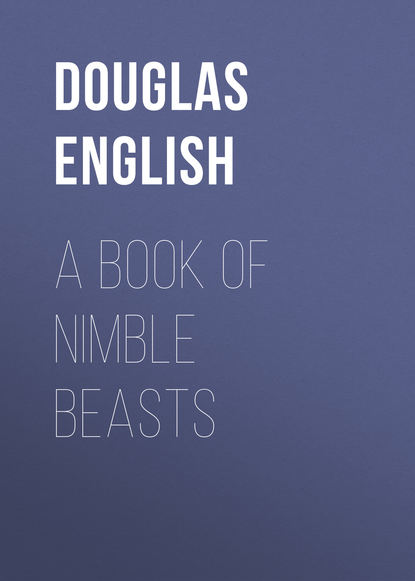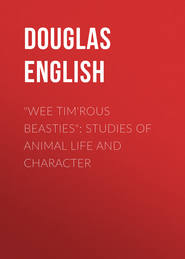По всем вопросам обращайтесь на: info@litportal.ru
(©) 2003-2024.
✖
A Book of Nimble Beasts
Настройки чтения
Размер шрифта
Высота строк
Поля
From spray to spray she flitted. Flower after flower she robbed of its pale nectar. Bud after bud she nibbled. At last she found the food she sought, and, with her strength renewed, took flight. Upwards she soared; three times she circled round; then in a straight, unbroken course, whizzed to her shaft. Her pace was scarcely slackened as she entered. Her wings closed lengthways on her back, and, in a moment, she was at the bottom.
Something was there before her.
Something six legged, which kicked and squirmed and writhed. Something which coiled to a hard, slippery ball, and rolled away from capture.
There was no space for it to pass, and yet there seemed no holding it. At last she pinned it with her feet, and, backing, dragged it upwards to the light. It was a radiant jewel fly, a squat, short-waisted, dumpy thing made glorious by its colour. Gems sparkled on it head to tail, sapphire and ruby, emerald and topaz, and, as it struggled, fire of gold blazed and died down upon its jerking body. Instinctively she shook and worried it. Instinctively she flung it down the slope. Head over tail, tight-clenched, it spun, nor opened till it reached the grass below. Here it snapped out to shape again, took instant wing, and, with a glancing flight, regained the ledge.
"An excellent shaft, Madam; quite excellent. No doubt you made it for a special purpose. Now I–"
"Listen to me," said Spinipes, "and mark my every word. If you come near that shaft again—if you so much as touch it with your feet, I'll sting your prying life out."
She charged at it full swing and chased it off the ledge.
"An area sneak!" she muttered, as she dropt underground once more—"and over-dressed at that."
The last to cease from play was the Rose-Chafer
Below the walls showed signs of the encounter—it took ten minutes to repair their glazing. When this was done, she crept back to the entrance. It was high noon. A shimmery haze rose from the heated sand. The hum of work died fitfully away, as, one by one, the homing bees sought shade. The digger-wasps dived deep into their holes; the hunting spiders hid themselves. These were the last to cease from work; the last to cease from play was the rose-chafer.
Him the fierce blaze of heat impelled to bursts of clumsy flight. Across the pit and back again, and up and down the surface of the cliff, he whirred and swung at random. Soon even he grew listless, and crept within the shelter of the privet.
The change came with a catspaw breeze, which rippled from the valley, and, in its quiet passing, fanned the cliff.
It brought back life and energy.
Out flew the bees, a jostling, buzzing throng of them, see-sawing wildly up and down, swinging, reversing, wheeling. At length they towered and broke to work. Out crept the hunting spiders, zebra-coated; the fluttering, dancing, digger-wasps; the lightning-footed ants. Out, last of all, came Spinipes herself.
Out flew the Bees
Her first care was her toilet. She combed her long antennæ out and nibbled at each foot. A circling flight to stretch her wings ended where it had started; and, in a moment, she had plunged below. Two minutes she stayed underground, then came up slowly backwards. Between her jaws was a clean-cut sand pellet. She placed it on the rim of the shaft opening, and, with deft touches from her lips, cemented it in station. She danced about it joyously, with fluttery wings, with airy, buoyant feet, moistened it here, kneaded it there. Once more she dived and dragged a second pellet up, and fixed this too upon the rim. So diving, digging, fixing, shaping, she raised a low ring-parapet.
Hour after hour she toiled
Hour after hour she toiled, tier after tier she added, gluing each pellet firmly to the last, yet leaving open space between each junction. So rose a filagree tube of sand, so fragile that a touch would crumble it; so strong that it would bear four times her weight. Before a shadow reached the cliff, it was a half-inch high. But shadows meant an end to the day's work, and Spinipes crept down below and slept.
The morning sun had shone four hours before she stirred. She peered out round-eyed from her tower, and, twisting on the rim of it, hung for a while head-downwards. A flash of green and crimson light, and something settled under her. It was the Jewel Fly again.
"Fine progress, Madam, and a first-rate tower. I never saw a better."
No word said Spinipes, but straightway launched, and flew at her.
"Out, cuckoo-sneak!" she screamed. "Out! or I sting!"
The Jewel Fly dodged like a gnat, and vanished round the corner.
She certainly meant mischief.
The lowest chamber of the shaft now held a precious thing—a spindle-shaped gold egg, slung to the side-wall by a silken thread. Back darted Spinipes to look at it; and test the fine-spun sling again; and fuss with it; and feel that it was hers.
The lowest chamber of the shaft now held a precious thing
Then up to her look-out once more. This time she dropped down to the sand and sunned herself contentedly.
The Bees had long been working. Forward and back they passed unceasingly, now and again one towered, now and again one settled; but never did their labour-song, a droning, buzzing, humming chanty, weaken or gather strength. The Jewel Fly had vanished altogether, yet Spinipes still seemed to fear her coming. A full half hour she stayed on guard, and spent the time in adding to her tower, and rounding off its entrance, which, of its own weight, took a gentle down-curve. Then, after one last gaze upon her egg, she flew afield.
"Good hunting, sister!" said the Ophion Fly. She sat on the same leaf as yesterday.
"I want them now," said Spinipes.
"The're thousands of them, thousands," said the fly, "and most of them quite fat."
It was a flabby, green, black-headed Grub
But Spinipes was too engrossed to hear her. Already, swayed by instinct she was hunting, hunting an unknown quarry in the lucerne. From plant to plant, from leaf to leaf, she fluttered. Now she dropped down to earth, and ran this way and that in the green twilight tangle. Now she sped nimble-footed up a stalk. Now she took flight and skimmed above the leaves.
At last she paused, her every muscle trembling, and stared at what confronted her.
It was a flabby, green, black-headed grub, fixed slug-like on its food-plant. A trail of skeleton tracery marked where its jaws had passed, and, as it reached the border of its leaf it swung its head, and starting near midrib, gnawed yet another ribbon-strip of green.
It ceased to feed as Spinipes appeared, and rested motionless, until her weight made its leaf-platform shiver. Then it dropped silently to earth. But Spinipes reached earth almost as fast, and, quartering every inch of ground, found it and gripped it tightly. It struggled feebly as she pinned it down, and, as she stung it, shuddered. The sting was measured to the millionth part. It robbed the grub of sentient life, yet left it living. So Nature had enjoined. For every infant Spinipes, a score of live green grubs. Robbed of full life, lest struggling they should harm the egg; forbidden death, lest dying they should taint the shaft; lulled to long sleep in mercy. Of Nature's ordinance the grub knew nothing—and Spinipes knew nothing. Her task was to make store of food against the time when her gold egg should hatch. Instinctively she knew the grub was food: instinctively she paralysed its being: instinctively she laboured to transport it.
Her jaws were fastened tight behind its head. Slowly she dragged it up a stalk until blue sky alone was over her. Then, loosing her mouth-grip of it, and clasping it with all six legs, she soared on high; one long unbroken down-glide brought her to her tower. An instant's pause to shift her grip, and she had pushed the grub within the entrance. Keeping a foot-hold on it, she eased it gently downwards, until it lay beneath her egg. She turned it over on its back and propped it to the side wall, caressed her egg, and mounted to the light again.
Back to the lucerne field she flew, and, in ten minutes, reappeared, a second grub beneath her.
This, too, she propped up carefully, and so she worked throughout the day, hunting, benumbing, storing. Twelve grubs in all she brought. All twelve she packed into a single pile. A few made feeble movements, and these, for prudence' sake, she stung afresh.
She passed the night contentedly, for it had been good hunting.
An instant's pause to shift her grip, and she had pushed the grub within the entrance.
"Take that—and that—and that," said Spinipes, and drove her sharp sting home.
Twelve Grubs in all she brought
The morrow's sky was wind-swept. Across it scurried wisps of grey with torn and fretted edges. These raced to catch each other, and fused in rounded velvet clouds. Mass joined to mass, and, surging slowly upwards, veiled the sun. Southwards, where earth met sky, a fine-drawn streak of blue endured, while, here and there, a rent across the veil gave passage to a radiant fan-spread beam. Once only did such radiance reach the cliff. It brought a treacherous message. Out swarmed the bees to snatch the chance of work, and out, with like intent, came Spinipes. Straight to her hunting-ground she flew, but, even as she reached it, came the rain.
For two hours she was weather-bound. At last a watery gleam of light, mirrored in every dripping leaf, enticed her from her shelter. Homeward she sped, and, reaching home, found havoc. Her tower was gone—the rain had razed it utterly—but there was worse mishap than this. Swift-scurrying on the surface of the sand were gangs of ants, and every gang was busy with a grub, one of her grubs. They pulled and pushed and shouted to each other, and worked their burdens upward to the cleft which marked their city's entrance. She poised aghast, as with a mocking spit at her, the gaping shaft disgorged another grub. Six sturdy ants came with it, and, ranging up in order, (a pair to tug, a pair to push, a pair to guide,) commenced their long ascent.
The grubs might be replaced in time—what of her precious egg? Downwards she tumbled headlong. Three grubs, the lowest of the pile, were left; her egg— She had been in the nick of time. Her egg was there, nay more, it was uninjured. Her mother instinct told her this as, with quick trembling passes, she felt the hang and weight of it. Her mother instinct swung her round, as down the shaft she heard a scraping footfall. Even as she turned, an ant's black face peered round the lower bend.
"Out thief!" she cried. "Assassin! Bandit! Robber!"
The ant retreated hurriedly, but all that night she sat at the shaft's mouth, and barred the way below with her own body.
Next day the weather mended—a blaze of sun from an unclouded sky, and, on the sand-cliff, ecstasy of life.
Hard work in store for Spinipes! Three hours she spent in raising a fresh tower, five hours in reprovisioning her burrow. But she no longer worked alone. For others of her race had found the cliff, and other towers, twin to her own, were rising from the sand-ledge. Between them pygmy digger wasps dug shafts to match their bodies, and trident-tailed ichneumons sailed about them, and sneaking, prying, jewel flies, here, there, and everywhere on mischief bent.






